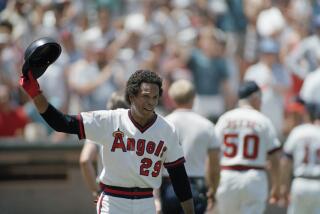POP MUSIC REVIEW : Hark, the Heralded Angels Sing With Hard Rock Crunch
- Share via
SAN JUAN CAPISTRANO — In their Orange County debut at the Coach House on Sunday, the much-heralded Arc Angels proved to be a curious, though largely successful, cross between a Texas roadhouse band and the ‘70s Bad Company.
The group, which actually is from Texas, is fronted by onetime guitar prodigy Charlie Sexton and fellow stringman Doyle Bramhall II (briefly an adjunct player with the Fabulous Thunderbirds and son of Stevie Ray Vaughan’s songwriting partner), and propelled by the late Vaughan’s rhythm section, bassist Tommy Shannon and drummer Chris Layton. The quartet mixes knowing lyrics (many co-written with L.A. staple Tonio K.) with a thick Brit-rock sound ameliorated by some Austin grit and swing.
Unlike most hard rockers’, their songs probe a bit--exploring the difficulties of walking a straight line in “Too Many Ways to Fall,” viewing a lost generation of trendy young drunks in “Paradise Cafe” and, in “Always Believed in You,” asserting faith despite a world gone awry:
I was born back in the ‘60s.
I was born and raised to win.
We had beaten back the darkness.
Somehow the darkness slipped back in.
“The Famous Jane” features some typically Tonio K. special wordplay about Janes, sweet and otherwise:
We met for the first time in fiction.
We saw Jane run--run Jane run.
Now Jane has become an addiction.
Janie’s gotten serious and she carries a gun.
Like much of the material, the song had a decidedly ‘70s hard rock crunch, set apart by the military snap of Layton’s drumbeat and the interplay between Sexton’s 12-string Rickenbacker and Bramhall’s slide guitar. Other thunder lizards included “Spanish Moon,” with heated vocals from both singers, and the set-closing, possibly hit-bound “Living in a Dream.”
The backing on “Sweet Nadine” was reminiscent of Led Zeppelin’s “Ramble On” but more often the group found its own sound, as in the clashing, nearly dissonant guitar lines on “Sent By Angels.”
Along with Vaughan’s rhythm section, both Sexton and Bramhall’s six-string sensibilities seemed borrowed from the late master; his fiery influence ran particularly strong through the blues covers. Indeed, when he first came on the scene in the mid-’80s, Sexton was touted as the next Vaughan, though he fooled everybody and became just one more “next David Bowie” for a while.
During John Lee Hooker’s “Dimples,” Sexton seemed firmly back on his old turf, playing deft solos that spoke in phrases instead of cliched licks. Bramhall also stepped out in the song with a tasty wah-wah pedal excursion.
Sexton clearly is a more accomplished singer and player than Bramhall, but the latter’s garage-like enthusiasm made for some musical surprises. At other times, though, the band seemed to be working without any particular vision.
A cover of Jimi Hendrix’s “Angel,” for example, seemed to meander and fell apart in places. There didn’t always appear to be a spark of purpose behind Sexton’s assured stage moves and Bramhall’s coltish, star-struck approach (his stage garb ran to purple velvet jackets and mounds of turquoise). And while cleverly constructed and loudly delivered, not all the material had much heart to it.
There’s little point in comparing the Arc Angels with someone as masterful and rare as Vaughan--whose music could seem like a full-on faucet connected to a better world--except in one regard: He always give his performances everything he had, and while the Arc Angels played well, they don’t yet seem entirely to be playing for keeps.
The show was opened by raspy screamer Sass Jordan and her band, which sounded like half the hard rock bands of the ‘70s, though not half as good. The seven-song set was drawn mostly from Jordan’s 1991 debut album, “Racine,” though a James Gang cover was included, perhaps to remind that dumb riffs are timeless.
More to Read
The biggest entertainment stories
Get our big stories about Hollywood, film, television, music, arts, culture and more right in your inbox as soon as they publish.
You may occasionally receive promotional content from the Los Angeles Times.







